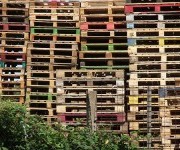Send your question to Umbra!
Q. Dear Umbra,
Our Occupy group is looking for information regarding the safety of using wooden pallets. They want to use them under tents, to help stay drier, and possibly to burn (for heat only, not for cooking). I found a Grist article on pallets from a few years ago, but wondered if there’s any current information. Thanks!
Sylvia P.
Haynesville, La.
Photo: Merv StapletonA. Dearest Sylvia,
How it warms my heart to think of you down there in Louisiana, taking a break from chanting about democracy to check the Grist archives. My reply comes during uncertain times, so I don’t know whether this question is still top of mind for you. But since wooden pallets are increasingly popular with DIY-ers and other people interested in crafty reuse of materials, I’m going to take this opportunity to revisit the issue. And then I’m going to wax philosophical. Watch out!
When I tackled this topic before, we learned that wooden pallets used internationally are treated with pesticides, while domestic pallets are often untreated, or heat treated (a relatively safe option noted by a “US-HT” stamp). That is still the case. However, information has come to light about possible issues with E. coli and other pathogens hanging out in the wood. There was also at least one case of nasty byproducts making their way into medicines shipped on chemically treated pallets. As a result, the plastic industry has mounted quite a campaign to get businesses to switch to plastic pallets, and wooden pallets have taken a hit.
All that said, I think you can feel fine about using pallets as tent platforms. But given the many uncertainties about chemicals and pathogens, I would not burn them. As for those interested in using pallets for other projects: Please proceed with caution. Do not use them to build children’s toys or furniture; do not eat off of them; and, unless you are absolutely certain about their origins, do not use them inside the house.
Sylvia, your letter gives me an excuse to dispense a few other thoughts on Occupy and sustainability, some pragmatic, some less so. First, I hope your encampment is doing what it can to reduce its impact. I hear that many of the protesters have been recycling waste, composting, and reusing graywater. Others have taken steps like using pedal-powered generators, setting up sustainability committees, and holding environmental teach-ins. Little urban Edens out there, as sometime Grist contributor Christopher Mims puts it.
All this is well and good and admirable. But I want to offer an observation from my own perch at Occupy Grist’s Basement.
What is conveyed too often — by media coverage and by efforts to yoke the Occupy movement to other green issues — is the idea that sustainability is some sort of separate endeavor or special interest. But sustainability is not a table in the corner of the park, or a subcommittee. It relates to everything that people are furious about today. And it can be the solution to everything that’s wrong with the stewpot we’re in, from corporate greed to climate change. The key to better jobs, better health, better food, better neighborhoods, better business practices? It’s this thing called sustainability.
Other thinkers have pointed out the innate connections between economic and ecological concerns. Here’s Chip Ward in Grist, and here’s what Naomi Klein had to say a few weeks ago in Zuccotti Park:
The task of our time is to … insist that we can afford to build a decent, inclusive society — while at the same time, respect the real limits to what the earth can take … I’m not talking about regulating the banks and increasing taxes on the rich, though that’s important. I am talking about changing the underlying values that govern our society. That is hard to fit into a single media-friendly demand, and it’s also hard to figure out how to do it. But it is no less urgent for being difficult.
Whatever happens to the Occupy movement, those are words to remember.
OK, poor Sylvia, you asked about pallets and now you’ve gotten a sermon. I hope I’ve been of some use to you. And I hope you stay safe out there.
Interwovenly,
Umbra



